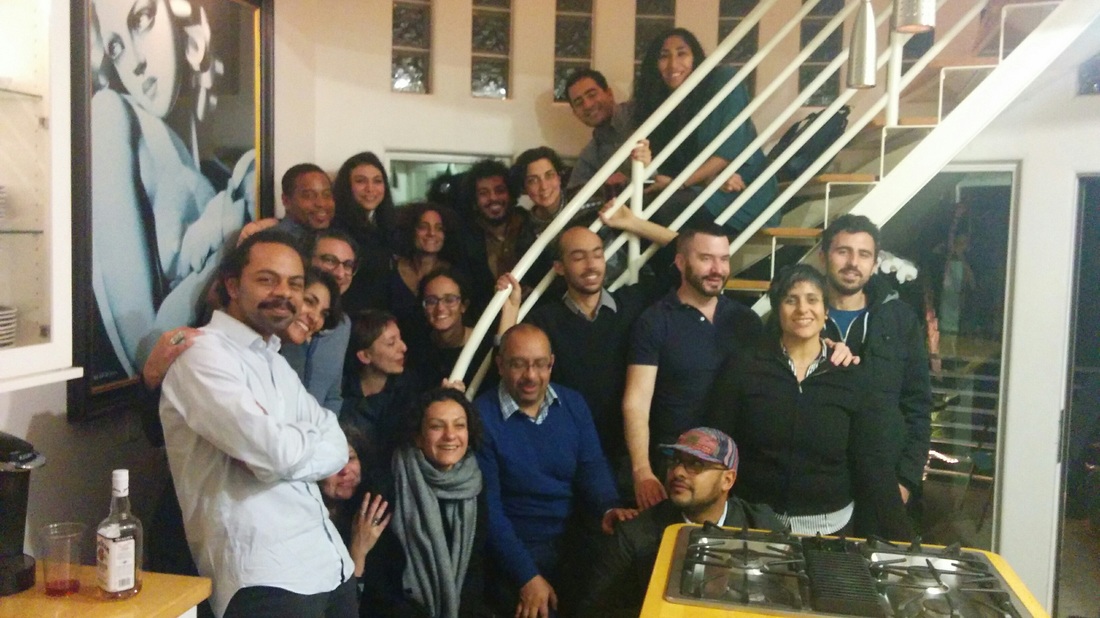- FAMA
- Researchers
-
Projects
- MESPI
- Knowledge Production Project >
-
Political Economy Project
>
- Development and the Uprisings
- Class Formations and Dynamics
- The Palestinian Economy: Fragmentation and Colonization
- Tunisia: A Political Economy in Transition
- Migrant States, Mobile Economies: Rethinking the Political in Contemporary Turkey
- Political Economy of the Middle East: Continuities & Discontinuities in Teaching & Research
- 2016 Political Economy Institute
- The Lebanon Project >
- The Palestine Project >
- The Civil Society Project >
- Middle East Media Project >
- The Egypt Project >
- Refugees and Migrants Project >
- Black-Palestinian Transnational Solidarities Project
- Initiatives
- Events
- Summer Institutes
- Internships
- Blog
AFTER TAHRIR: EGYPTIAN REVOLUTIONARY EXPERIENCES AND FUTURE VISIONS22-26 January 2016
University of California - Santa Barbara Santa Barbara This four-day research collaboration workshop was held at UC Santa Barbara on the five-year anniversary of the Tahrir Square uprising in 2011 that toppled Egypt’s long-term dictator Hosni Mubarak. These uprisings in Egypt accelerated waves of anti-crony-capitalist demonstrations, worker organizing, youth revolts, media insurgencies, and police brutality protests that overthrew governments, mobilized populations throughout the Middle East, and inspired the world from Wisconsin, to Mexico, to Baltimore. The Tahrir uprisings are called the January 25 Revolution in Egypt and the Arab world; it was on that day that millions of protesters first descended upon downtown Cairo with the aim of reclaiming history and power for the people.
The Egyptian uprising was one global turning point in the history of repression. Immediately following the January 25 Revolution in Egypt, at least fifty-eight countries around the world passed draconian laws to restrict or fundamentally cripple the right to protest and occupy civic space. Government in ostensibly “democratic” regions of North America, the European Union, and Latin America ratified repressive dictates. They also developed and deployed new apparatuses of surveillance and criminalization against those using the internet as one site of many for civic opposition. In the past five years after Tahrir, many of those who comprised this electrifying “2011 Generation” of human rights defenders and youth civic leaders have been fined, beaten by police, and arrested. In this challenging and historic context, in late January 2016, a uniquely talented group of human rights defenders, scholars, and activists converged at UC Santa Barbara to reimagine the shifting fabric of neoliberalism, the imperatives of popular sovereignty, the challenges of gender/sexuality/race justice in the context of repression, and the cultures of authoritarianism that are shaping our times, globally. The "After Tahrir" conference also featured a series of film shorts, new media projects, and video installation in the Michael Douglas Lobby of the Pollock Theater. Award-winning filmmaker Omar Robert Hamilton, internationally acclaimed curator Sarah Rifky, and media artist Heba Amin were among the conference participants who lead a lively discussion after the programming of video-clip artists and community based street videographers. The film and media collectives represented in our program included Kazeboon, an awareness and critical media collective in Egypt that documents and screens videos and films of military authoritarianism in public sites; Mosireen, a non-profit media collective in downtown Cairo born out of the explosion of citizen media during the revolution; R-Shief, a media system that collects, analyzes, and visualizes social media and holds one of the largest repositories of Arabic-language tweets, including content from the 2011 uprisings and Occupy movements; and a series of videos vignettes from “Democracy Dialogue” with Mohamed ElBaradei and Rajmohan Gandhi. All of the works featured in the "After Tahrir" conference series have emerged out of or tell stories in light of the revolutionary moment in Egypt. |
HighlightsOrganizers
Paul Amar Sherene Seikaly Laila Shereen Sakr Participants Adel Iskander Ahmed Shokr Ahmed Awadalla Amr Abdulrahman Anjali Kamat Asli Bali Atef Said Bassam Haddad Dalia Abd El Hameed Heba Amin Hesham Sellam Jessica Winegar Joel Beinen Lina Attalah Magda Boutros Mohammed Ezzeldin Momen El-Husseiny Mozn Hassan Omar Robert Hamilton Omnia Khalil Ranwa Yehia Sarah Rifky Wael Eskander Yahia Saleh Yasmin El-Rifae |
- FAMA
- Researchers
-
Projects
- MESPI
- Knowledge Production Project >
-
Political Economy Project
>
- Development and the Uprisings
- Class Formations and Dynamics
- The Palestinian Economy: Fragmentation and Colonization
- Tunisia: A Political Economy in Transition
- Migrant States, Mobile Economies: Rethinking the Political in Contemporary Turkey
- Political Economy of the Middle East: Continuities & Discontinuities in Teaching & Research
- 2016 Political Economy Institute
- The Lebanon Project >
- The Palestine Project >
- The Civil Society Project >
- Middle East Media Project >
- The Egypt Project >
- Refugees and Migrants Project >
- Black-Palestinian Transnational Solidarities Project
- Initiatives
- Events
- Summer Institutes
- Internships
- Blog


